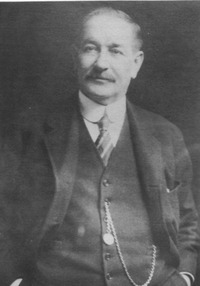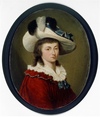
Source: Link
CASHIN, Sir MICHAEL PATRICK, businessman, office holder, and politician; b. 29 Sept. 1864 in Cape Broyle, Nfld, son of Richard Cashin and Catherine Coady; m. 23 Oct. 1888 Gertrude Clare Mullowney in Witless Bay, Nfld, and they had four sons and one daughter; d. 30 Aug. 1926 in St John’s.
Michael Cashin received his early schooling in Cape Broyle and during the summers crewed for his father, an inshore fisherman. After completing his education at St Patrick’s Hall School and St Bonaventure’s College in St John’s, he worked there briefly as a clerk. In 1886 his brother John died. With a loan from St John’s merchant Edgar Rennie Bowring, Michael took over, revitalized, and expanded his brother’s fishing business at Cape Broyle. The business prospered, and Cashin’s wife, Gertrude, played a significant role in it. Their activities included the provision of bait, ice, and other supplies to American and Nova Scotian banking vessels and the purchase of cod oil from them. In the early 1900s the Cashins and Bowring Brothers invested briefly in a developing whaling industry in Newfoundland and established a whaling factory at Cape Broyle. Bowrings had the controlling interest with the Cashins being responsible for the plant and workers.
Cashin was also the “King of the Wrecks.” The eastern coast of the Avalon peninsula, and especially the area near Cape Race, has historically earned a reputation as a graveyard for ships. Salvaging material from shipwrecks was the responsibility of government officials known as wreck commissioners, who entered into agreements with local fishermen to save the cargoes. The spoils were split among the fishermen, the owners and underwriters, and the wreck commissioner. Cashin’s association with Bowring Brothers, the exclusive agents for Lloyd’s of London in Newfoundland, gave him the opportunity in the late 1890s and early 1900s to gain financially by salvaging wrecks. Through both personality and physical strength, he established his authority over the fishermen, who looked to the wrecks as a means of supplementing their incomes.
His wife’s astute management of their business allowed Cashin to concentrate on a public career. He had entered politics in 1893 and won election as an independent to the House of Assembly for Ferryland, a district that would continue to return him by substantial majorities. Soon after taking his seat he joined the Liberal party of Prime Minister Sir William Vallance Whiteway*. Whiteway lost the 1897 election to Conservative leader Sir James Spearman Winter*, and Robert Bond assumed the leadership of the defeated Liberals in the assembly. The following year the Winter government signed a controversial contract with railway builder Robert Gillespie Reid*, and the Liberals split on the matter. Several, including Cashin, joined Bond’s rival, St John’s West mha Edward Patrick Morris*, in supporting the contract. In 1900, however, Morris and Cashin returned to Bond’s Liberal party, which in that year won a resounding electoral victory.
In March 1905 Cashin broke with Bond and sat as an independent Liberal. He disagreed with the government’s Foreign Fishing Vessels Act of that year, which prohibited American vessels from purchasing bait or supplies, or engaging Newfoundland crews, within Newfoundland’s territorial waters, a measure that threatened the livelihood of many of his constituents. He became a vocal critic of the government, the small group of Conservative representatives providing little opposition. In 1907, after Morris had also left the government, he and Cashin cooperated closely with the Conservatives, with Morris being the acknowledged alternative to Bond.
When Morris’s newly formed People’s party won election in 1909, Cashin became minister of finance and customs, a position he would hold until 1919. All his budget speeches would be written by Patrick Thomas McGrath, his closest political adviser. Cashin oversaw a period of great prosperity between 1909 and 1913, but it was a prosperity built in part on trade deficits. Government revenues depended generally on a customs tariff and Newfoundland imported more than it exported. The administration spent liberally on branch railways, including a line through Cashin’s district from St John’s to Trepassey. In 1913–14 and 1914–15 the government experienced budgetary shortfalls. After the outbreak of World War I, however, Newfoundland prospered from increased demands for its fishery products and there were substantial surpluses between 1915 and 1919. During the war Cashin served as vice-chairman of the Newfoundland Patriotic Fund and of the finance committee of the Patriotic Association of Newfoundland. He also supported the decision of the government of William Frederick Lloyd* to enact conscription in April 1918.
Lloyd had been brought into the government in 1917 when Morris formed a coalition with the opposition, which consisted of Lloyd’s Liberals and seven representatives of the Fishermen’s Protective Union under William Ford Coaker*. Following Morris’s resignation on 31 Dec. 1917 to accept a peerage in Britain, Lloyd became prime minister in January. After the armistice in November 1918, there was no further rationale for the coalition. Anticipating a general election, which the assembly in April 1919 scheduled for November, and wishing to distance himself from the FPU’s influence, Cashin moved to claim the leadership of the remnants of the People’s party, whose members still constituted a majority in the assembly. On 20 May he moved a vote of no-confidence in his own government and the motion was seconded by the prime minister. The vote carried that day and on 22 May Cashin formed a new administration.
In the election on 3 November Cashin’s newly named Liberal-Progressive party was soundly defeated by a coalition alliance headed by Coaker and Liberal leader Richard Anderson Squires*. Cashin presented a vigorous opposition in the assembly to Prime Minister Squires and his government. He was especially critical of Coaker, now minister of marine and fisheries, and his efforts to regulate the price of fish and the marketing of fish overseas.
In 1923 a combination of ill health and the need to broaden his party’s appeal among Protestant voters brought Cashin’s resignation as leader in favour of John Robert Bennett*. He nevertheless left his safe Ferryland seat that year to run in the three-member district of St John’s West, where Squires was a candidate. He placed second, just 11 votes ahead of Squires. The Squires government won re-election, but a series of scandals later in the year led it to resign. There then followed several brief administrations as political factions changed allegiance. Another election took place in 1924, but Cashin did not stand. He retired from public life because of continuing ill health, due evidently to diabetes. His son Peter John* was successful in his old district of Ferryland.
For his services during the war, Cashin had been created a kbe in 1918. In 1925 he received a honorary degree from Niagara University in Niagara Falls, N.Y., for his public career. “From the fishing boat to Prime Minister’s chair he went,” journalist Joseph Roberts Smallwood* wrote of him in 1926. “He started in common with every fisherman and he never forgot that such was his beginning. . . . With him down through his forty years of public endeavor he carried the wholesome tang of the sea.”
Fishermen's Advocate (Port Union, Nfld), 3 Sept. 1926. Peter Cashin, My life and times, 1890–1919 (Portugal Cove, Nfld, 1976); "Sir Patrick McGrath: a biography"(Canadian Broadcasting Corporation radio broadcast, St John's, 1967; transcript in Memorial Univ. of Nfld, Centre for Newfoundland Studies, St John's). Encyclopedia of Nfld (Smallwood et al.), 5: 636-37. I. D. H. McDonald, "To each his own": William Coaker and the Fishermen's Protective Union in Newfoundland politics, 1908–1925, ed. J. K. Hiller (St John's, 1987). Newfoundland Quarterly (St John's), 26 (1926-27), no.2: 24. S. J. R. Noel, Politics in Newfoundland (Toronto, 1971).
© 2005–2024 University of Toronto/Université Laval
Image Gallery

Cite This Article
Melvin Baker, “CASHIN, Sir MICHAEL PATRICK,” in Dictionary of Canadian Biography, vol. 15, University of Toronto/Université Laval, 2003–, accessed April 16, 2024, http://www.biographi.ca/en/bio/cashin_michael_patrick_15E.html.
The citation above shows the format for footnotes and endnotes according to the Chicago manual of style (16th edition). Information to be used in other citation formats:
| Permalink: | http://www.biographi.ca/en/bio/cashin_michael_patrick_15E.html |
| Author of Article: | Melvin Baker |
| Title of Article: | CASHIN, Sir MICHAEL PATRICK |
| Publication Name: | Dictionary of Canadian Biography, vol. 15 |
| Publisher: | University of Toronto/Université Laval |
| Year of publication: | 2005 |
| Year of revision: | 2005 |
| Access Date: | April 16, 2024 |













